Table Content
Survey questions
Surveys are the doorway to understanding — the pulse of your market, the sentiment of your employees, and the satisfaction of your customers. But what makes this doorway effective? A well-crafted question. With a myriad of types and categories at your disposal, creating a compelling survey can feel like navigating through a maze. Fear not, curious explorer! In this guide, we'll equip you with everything you need to formulate the perfect survey questions. Remember, every step we take in this journey is geared towards a single goal — making your voice heard, and more importantly, understanding the voices that respond.
Survey questions: List of types and categories
The diversity in survey questions is what makes them a potent tool in your research arsenal. Let's uncover the various types that you can leverage, each with its unique flavor and purpose:
Dichotomous Questions (Yes or No)
These questions are simple and straightforward, requiring just a "yes" or "no" response. For instance, a tech company might ask, "Have you used our new mobile app?"
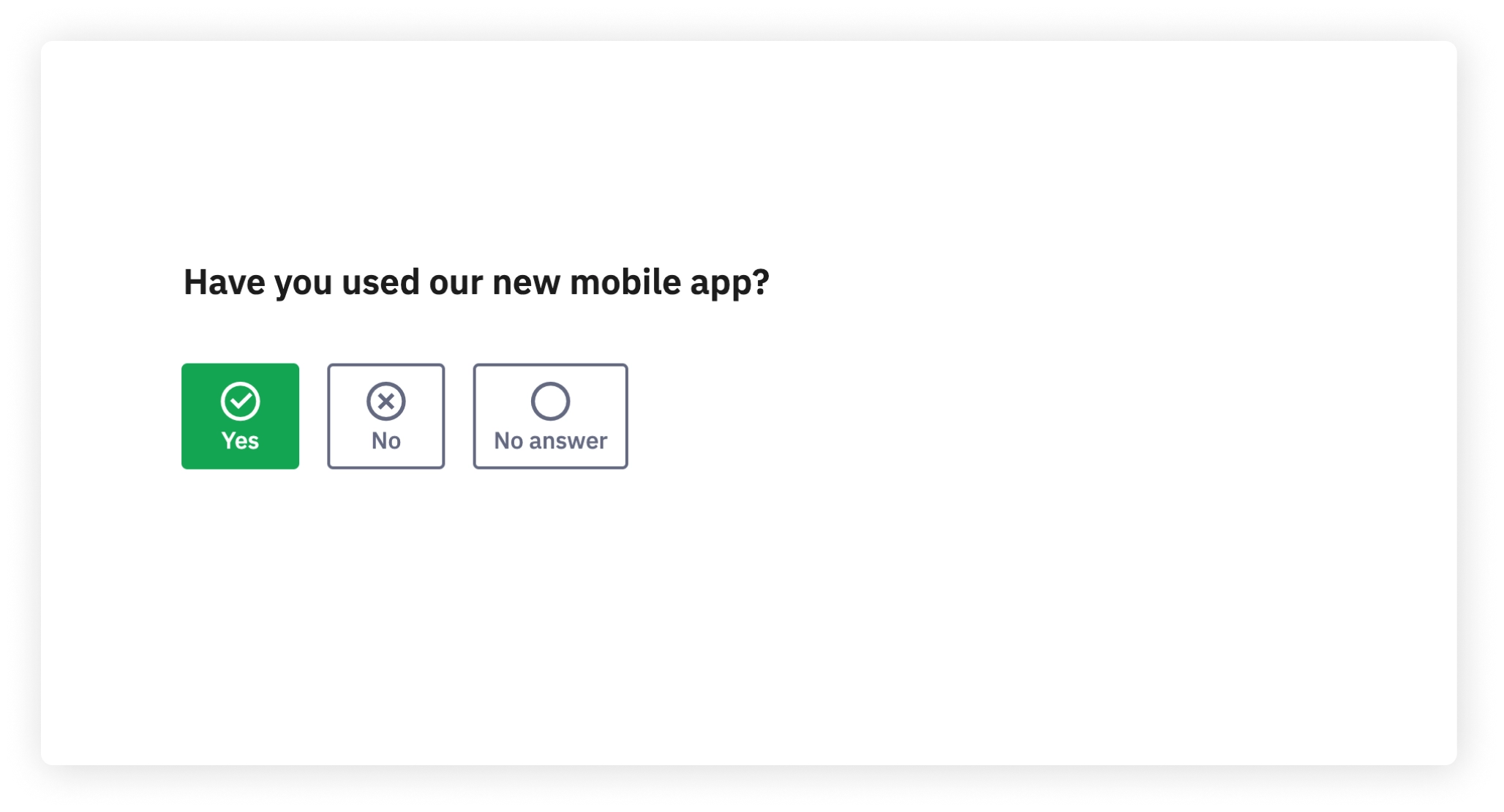
Multiple-Choice Questions
Great for when there are several potential answers but respondents need to select just one. An online store could ask, "Which method of payment did you use for your most recent purchase? (Credit Card, Debit Card, PayPal, Cash on Delivery)"
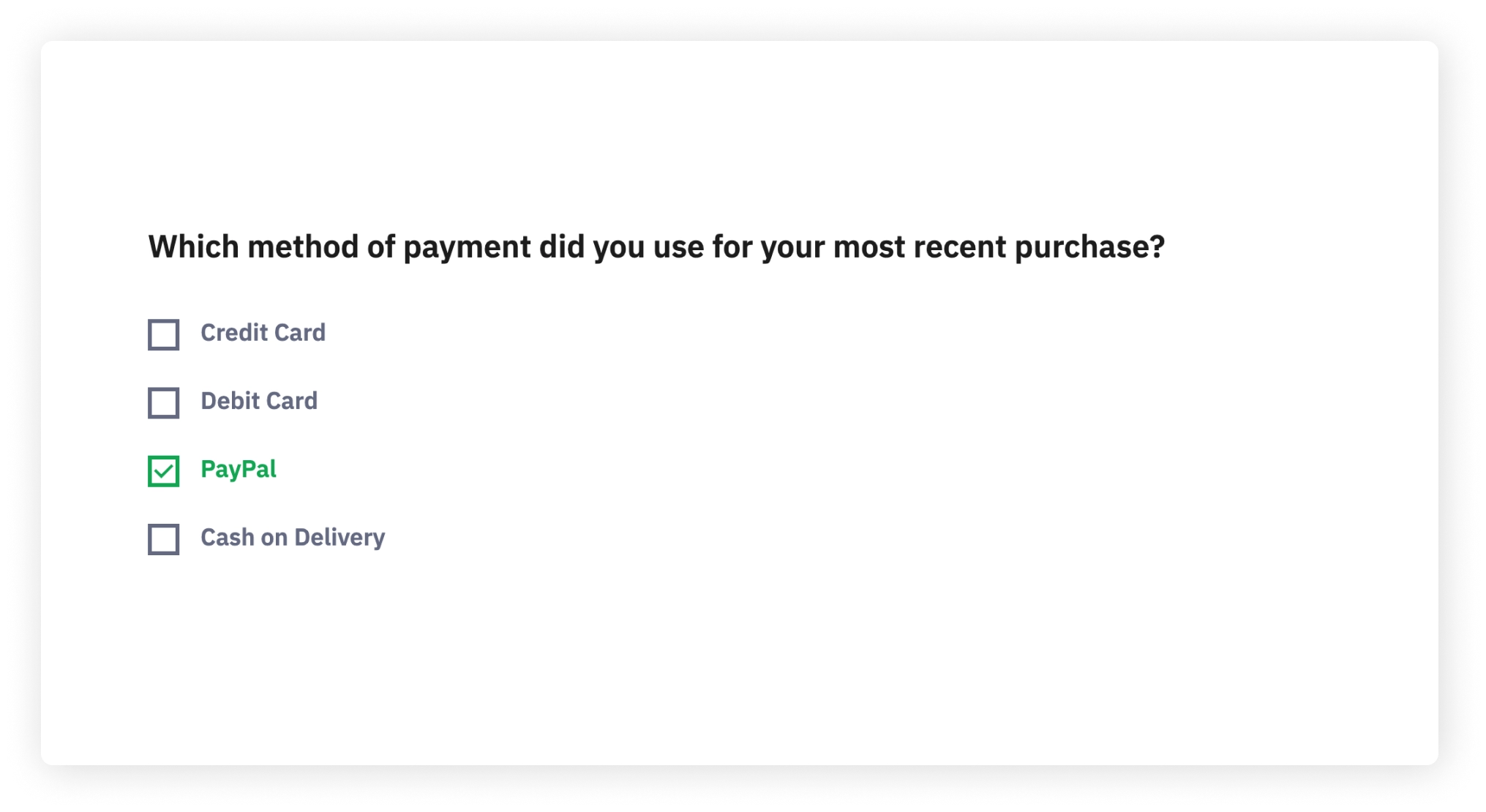
Numerical Questions
Numerical questions require respondents to provide a number as their answer, often related to age, quantity, or ranking. A fitness app might ask, "How many days per week do you exercise?"
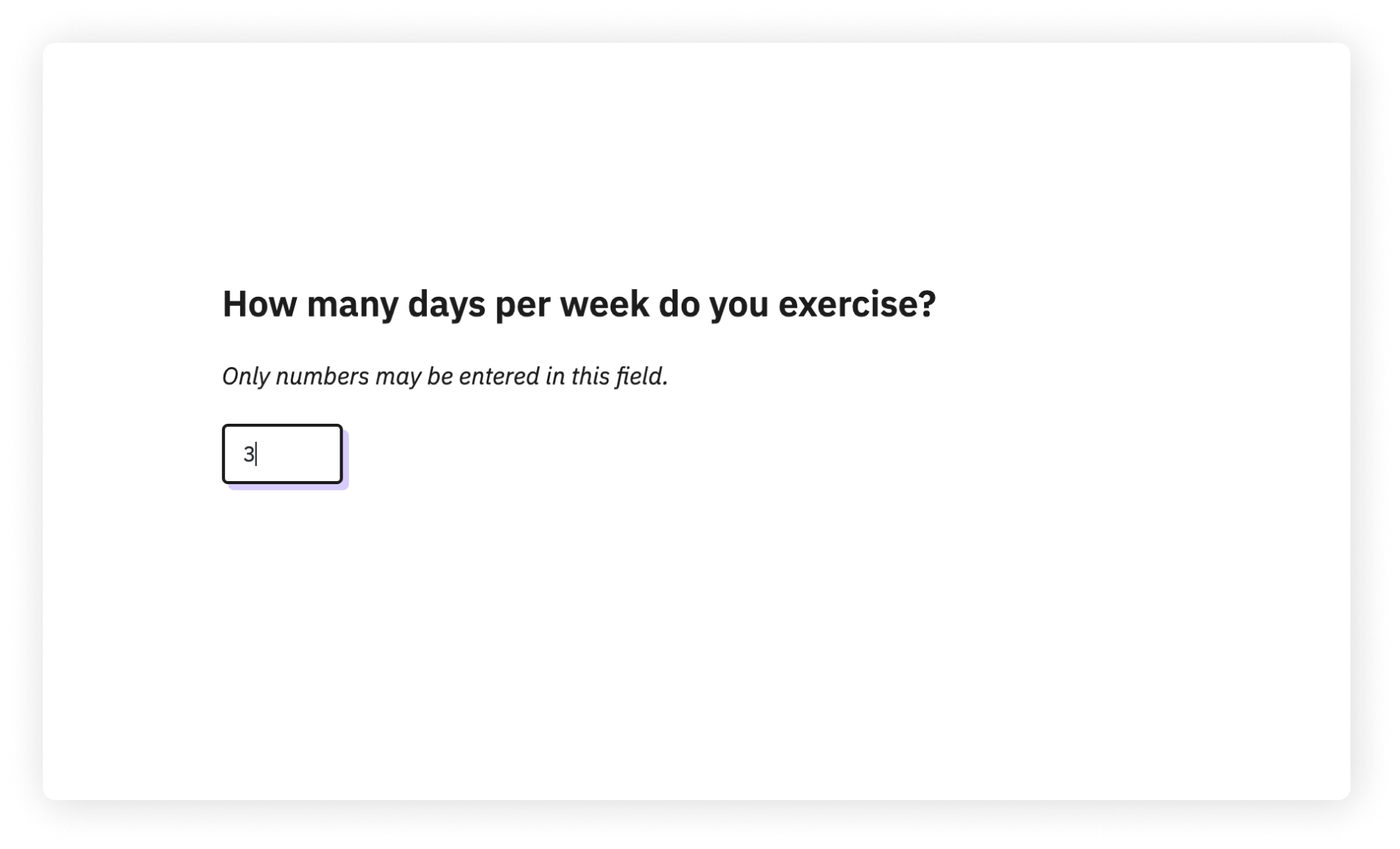
Nominal and Ordinal Questions
Nominal questions offer categories with no inherent order, like "Which social media platform do you use the most? (Facebook, Twitter, Instagram, LinkedIn)".
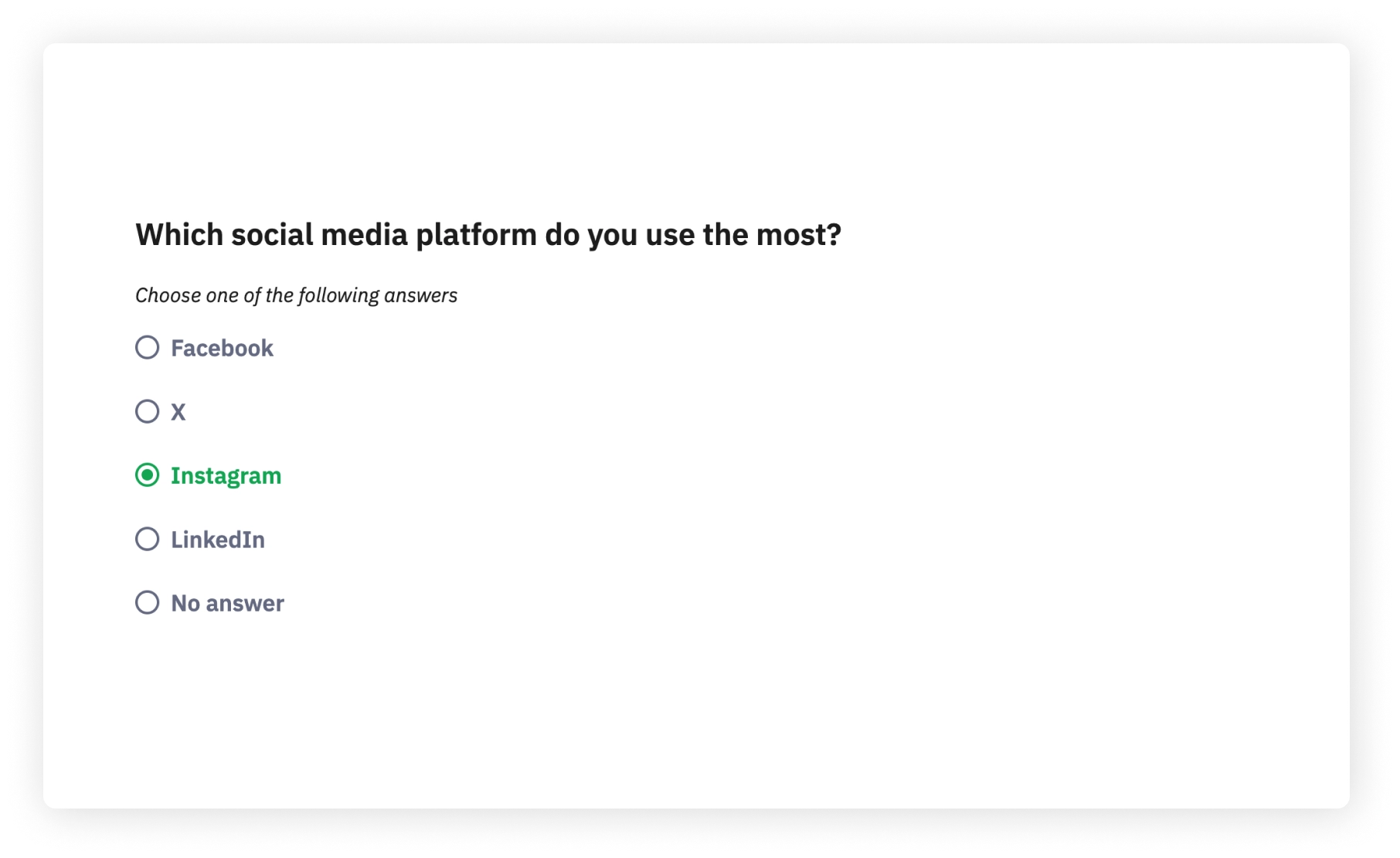
Ordinal questions provide ordered choices, such as "How would you rate your experience with our customer service? (Excellent, Good, Fair, Poor)".
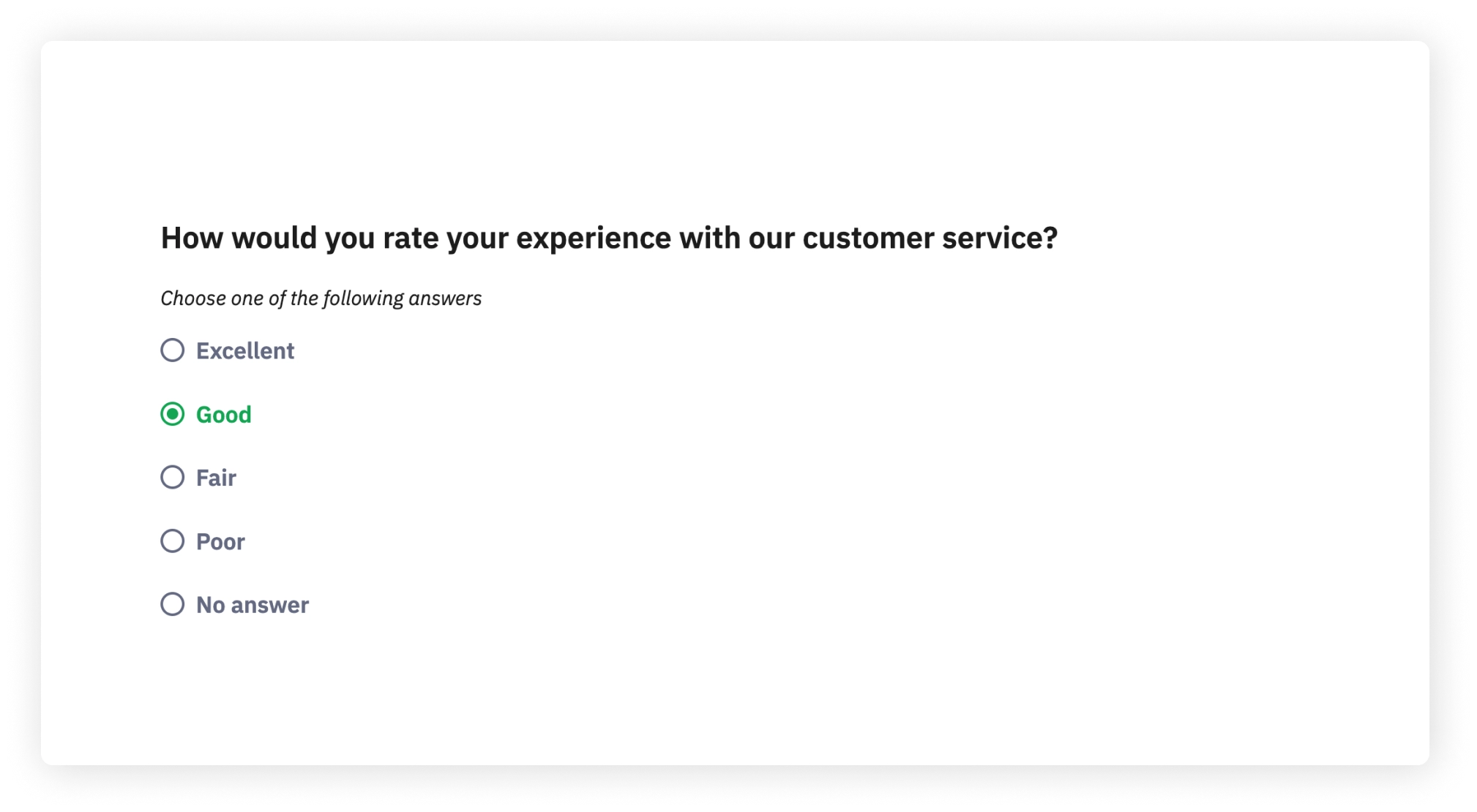
Rating Scale Questions
Rating scale questions allow respondents to rate an experience on a scale, such as 1-5 or 1-10. For instance, a restaurant might ask, "On a scale of 1-10, how would you rate your dining experience?"
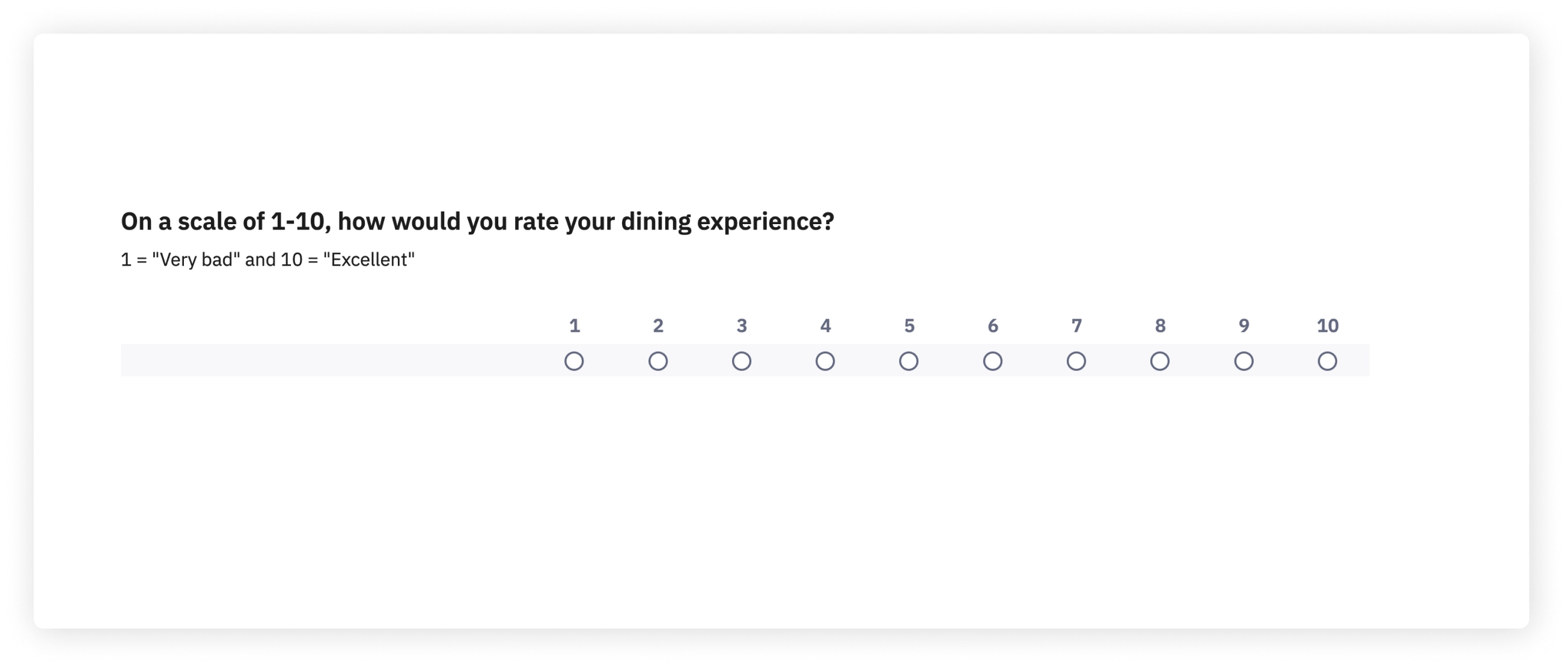
Ranking Order Questions
When you need to gauge preference or importance among options, ranking order questions are the way to go. A software company might ask, "Please rank these software features in order of importance: Speed, User-friendliness, Cost, and Customer Support."
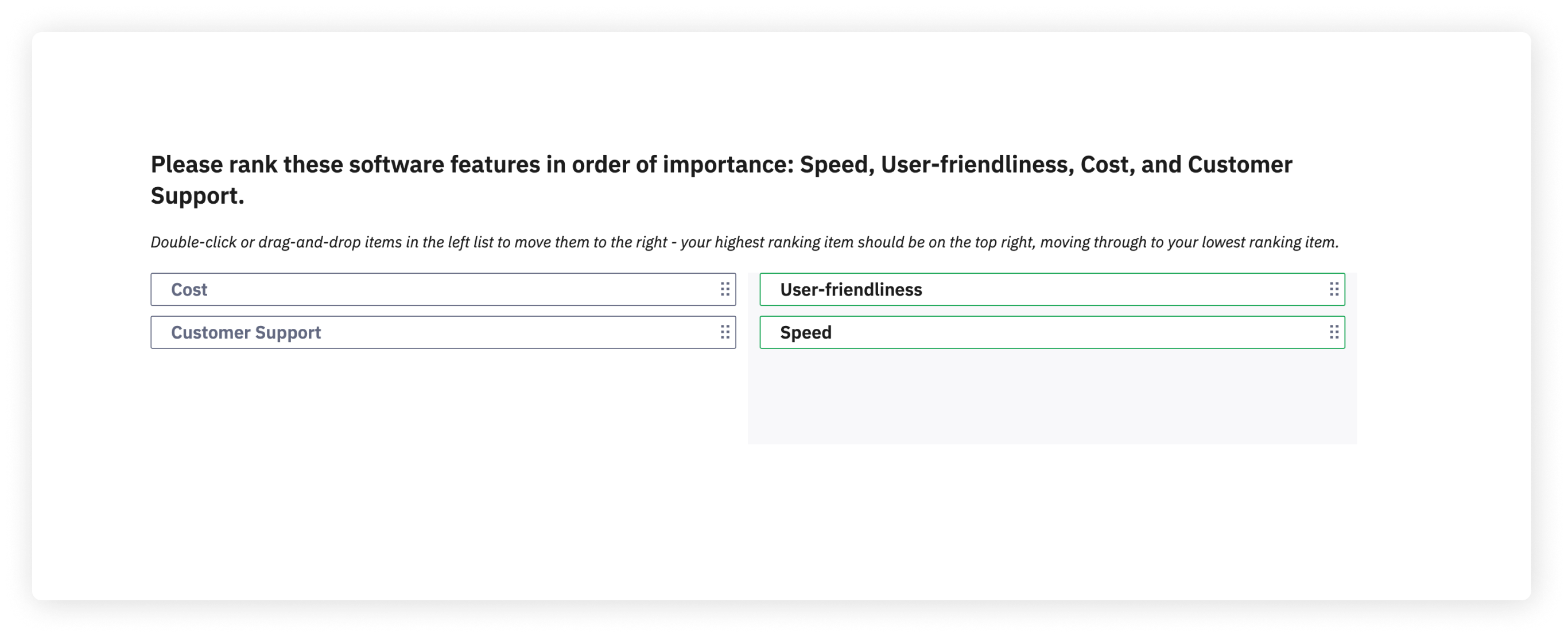
Likert Scale Questions
Likert scale questions allow respondents to indicate their agreement or disagreement with a series of statements. An e-commerce website might ask, "I find the website easy to navigate: Strongly Agree, Agree, Neutral, Disagree, Strongly Disagree."
You can also check out our article on Likert-Scales here.
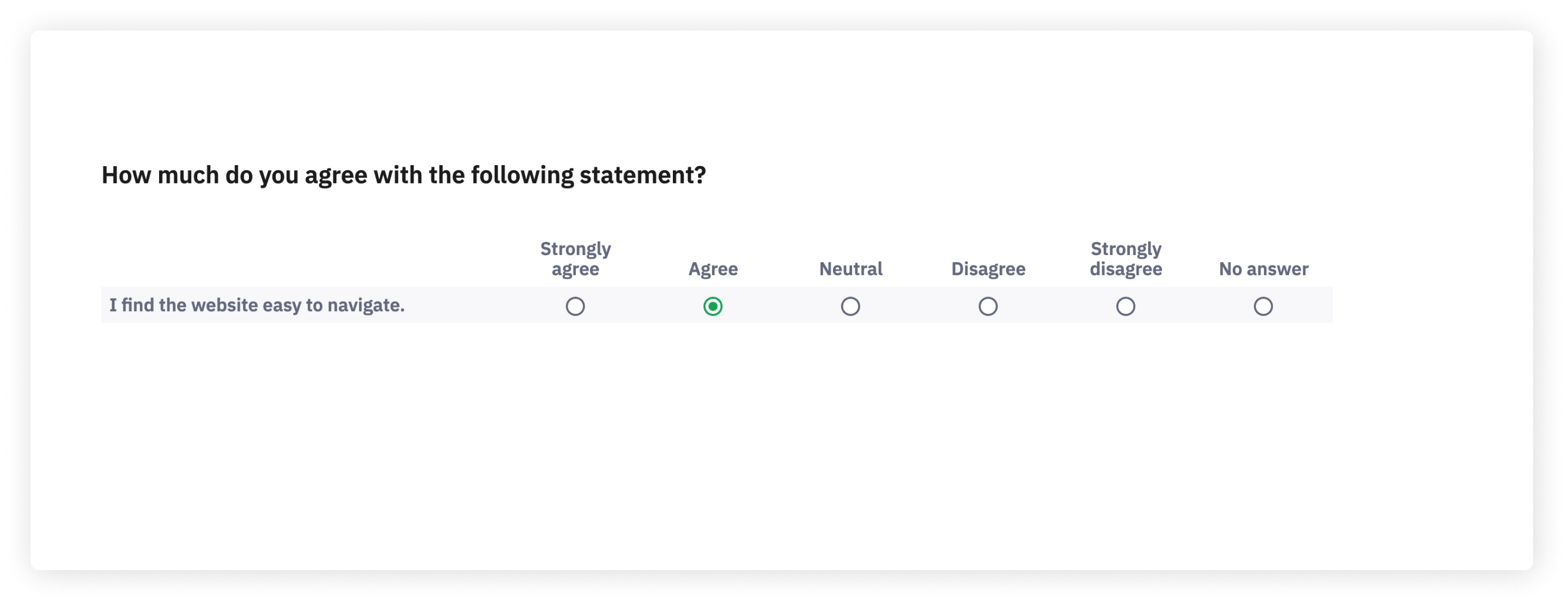
Matrix Questions
Matrix questions let you collect multiple data points in one question. For instance, a product satisfaction survey might include a matrix question like "Please rate the following characteristics of our product: Price, Quality, Appearance, Packaging, etc."
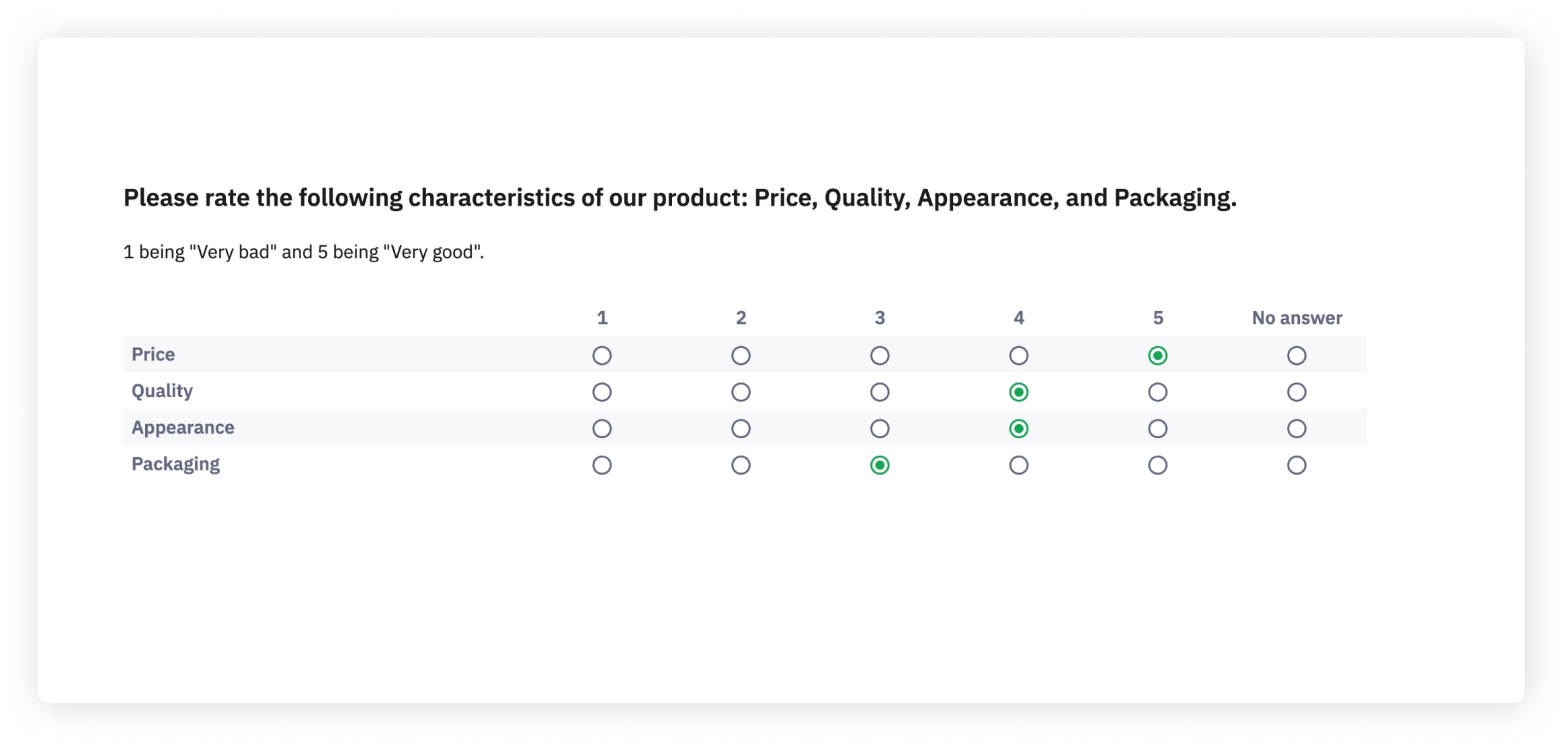
Dropdown Questions
Dropdown questions are perfect when you have a long list of options. A survey about automobiles might include a dropdown question like, "From the dropdown menu, please select the make of your current vehicle."
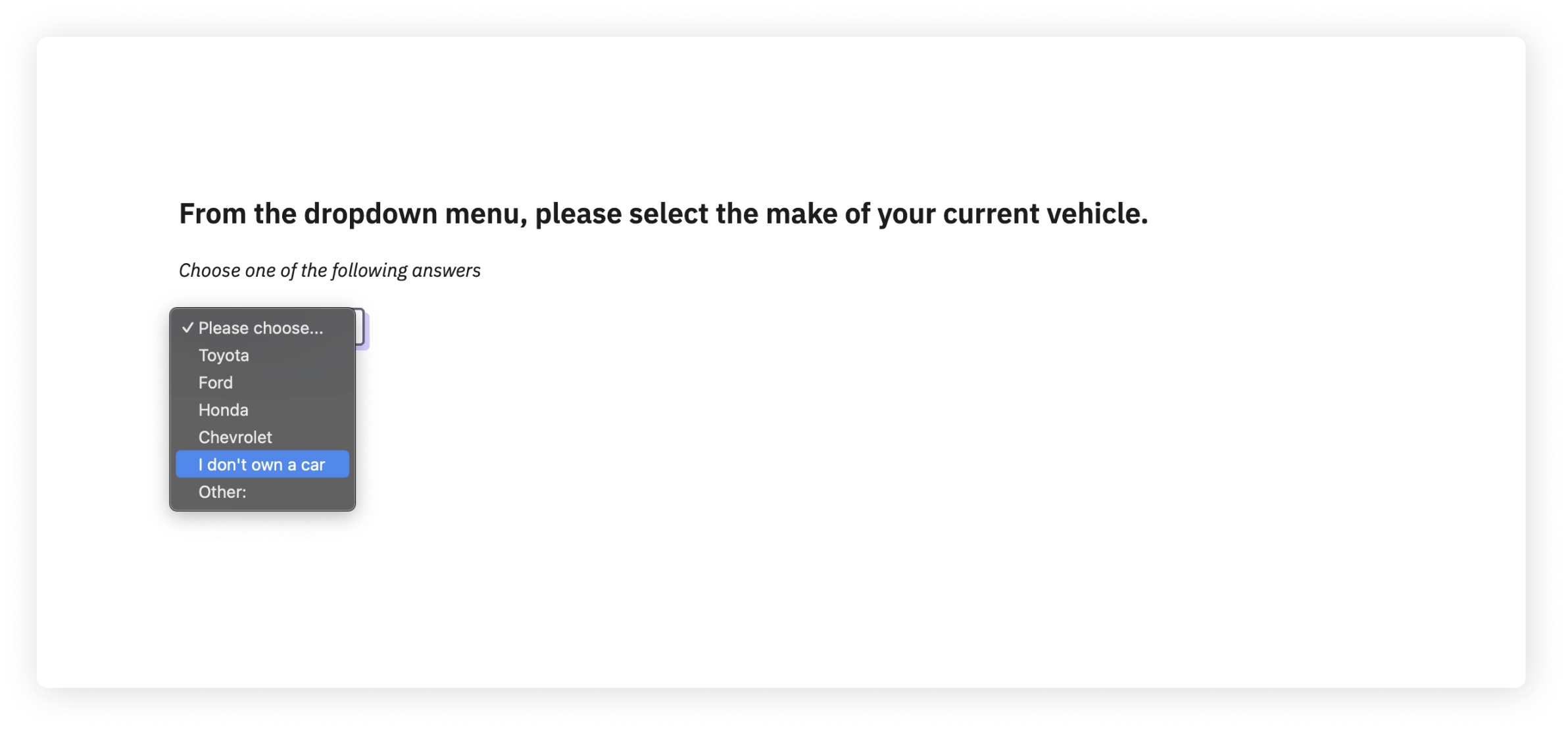
Demographic Questions
Demographic questions offer insights about respondents like age, gender, income, and education. An example would be "What is your age bracket? (18-24, 25-34, 35-44, 45-54, 55+)".
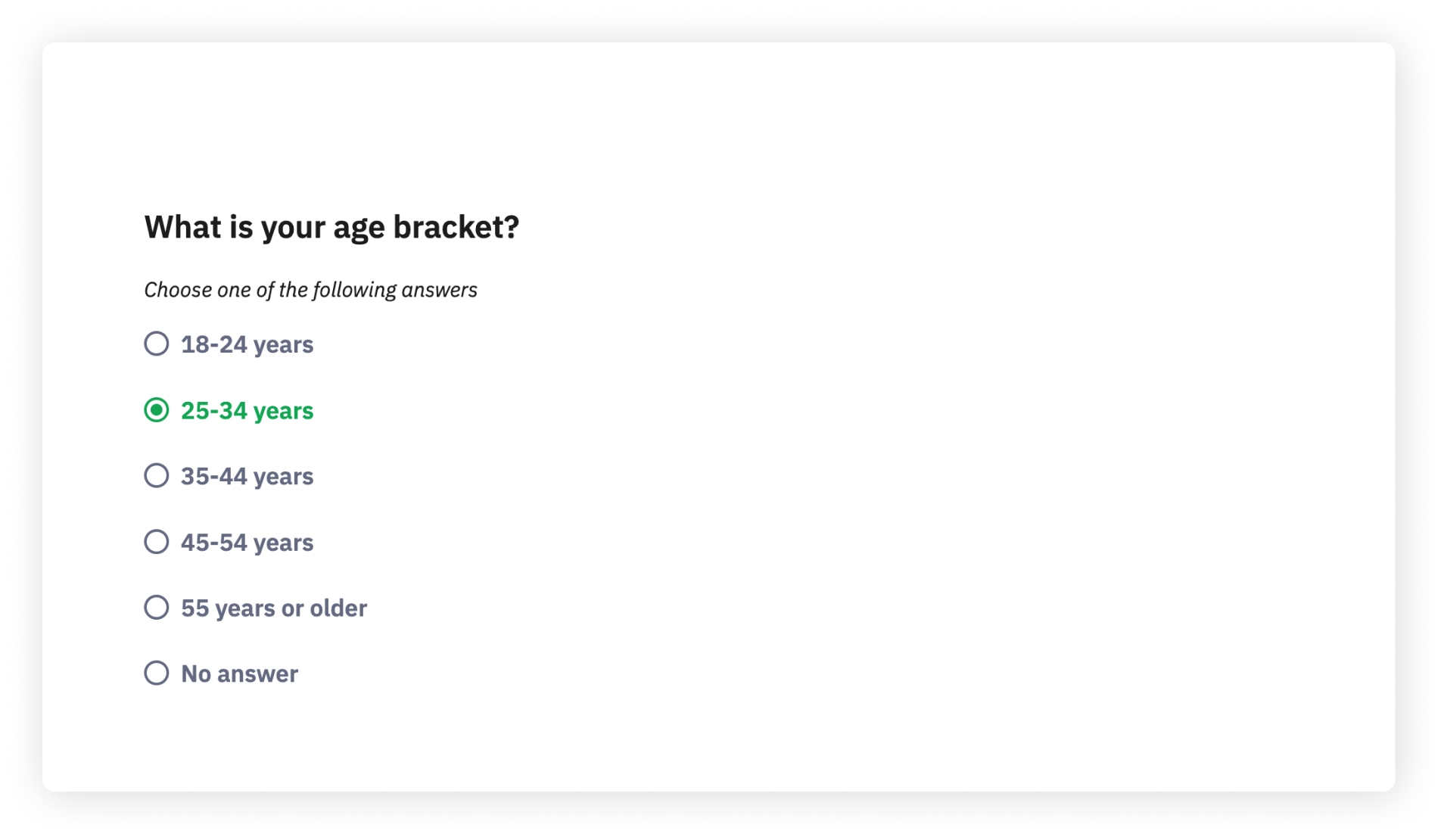
Image Choice Questions
Image choice questions let respondents express their opinions using visuals. A clothing brand could include images of different styles and ask, "Which of these styles do you prefer?"
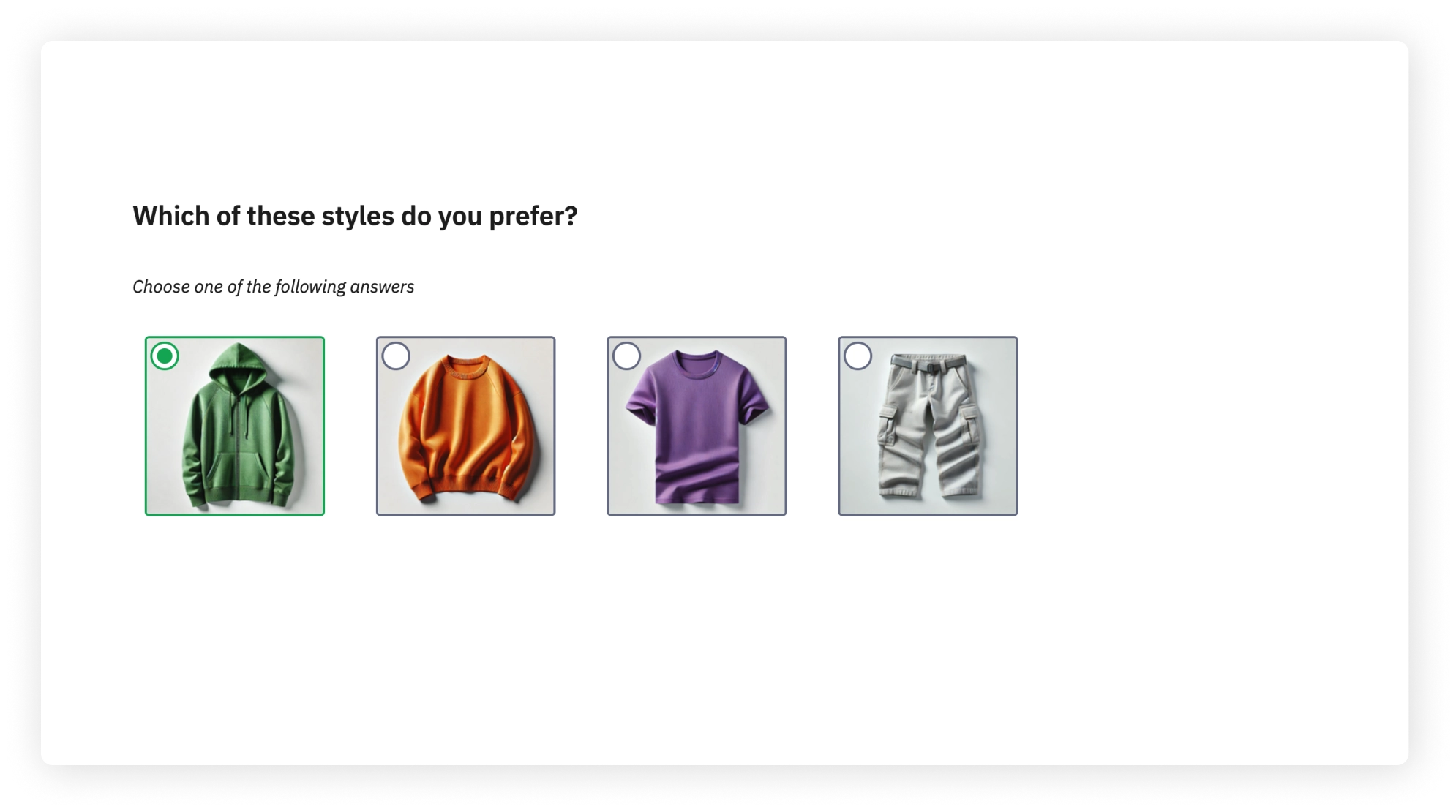
Benchmarkable Questions
Benchmarkable questions let you compare your data with industry standards. An example is the Net Promoter Score (NPS) question, "On a scale of 0-10, how likely are you to recommend our company to a friend or colleague?"
In case you want to read more about the NPS, check out our article on this topic.
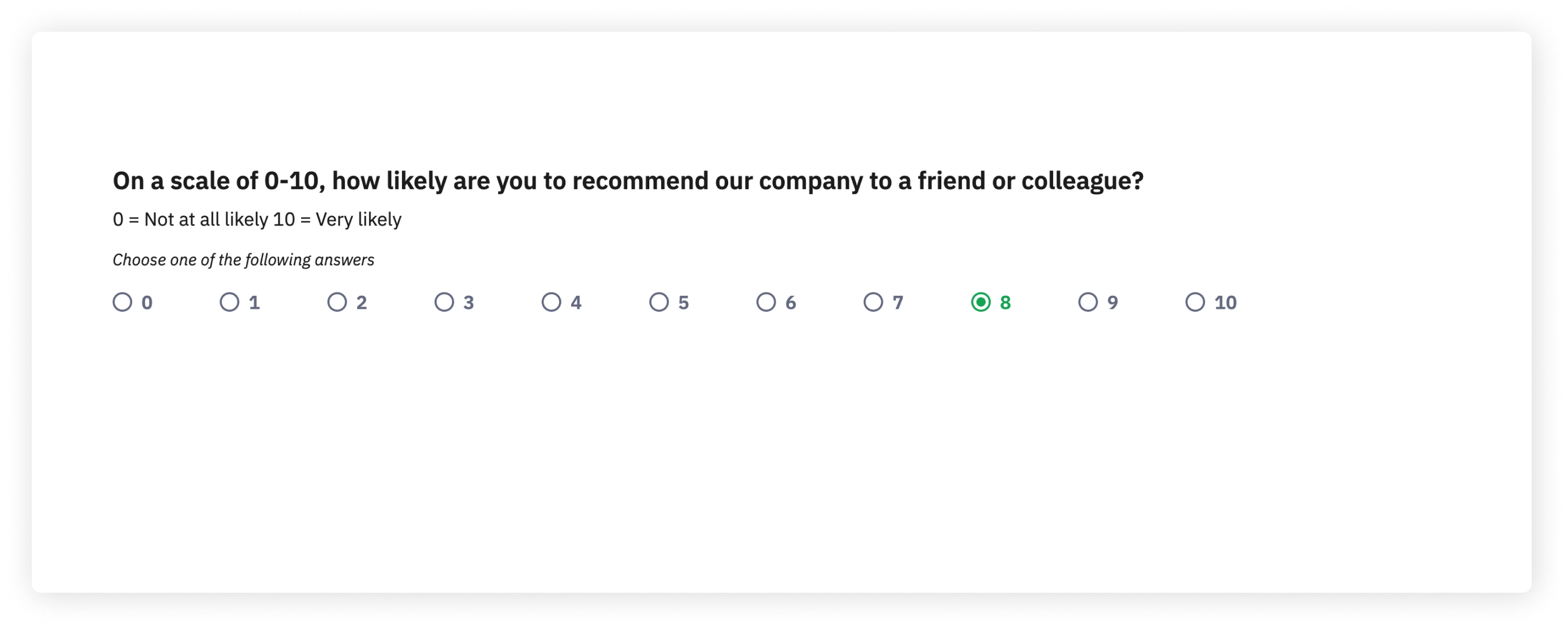
Matrix Table Questions
Matrix table questions offer a more detailed view of different aspects of a single topic. An airline might ask you to rate your satisfaction with several aspects of your flight, from booking to arrival, on a scale of 1-5.
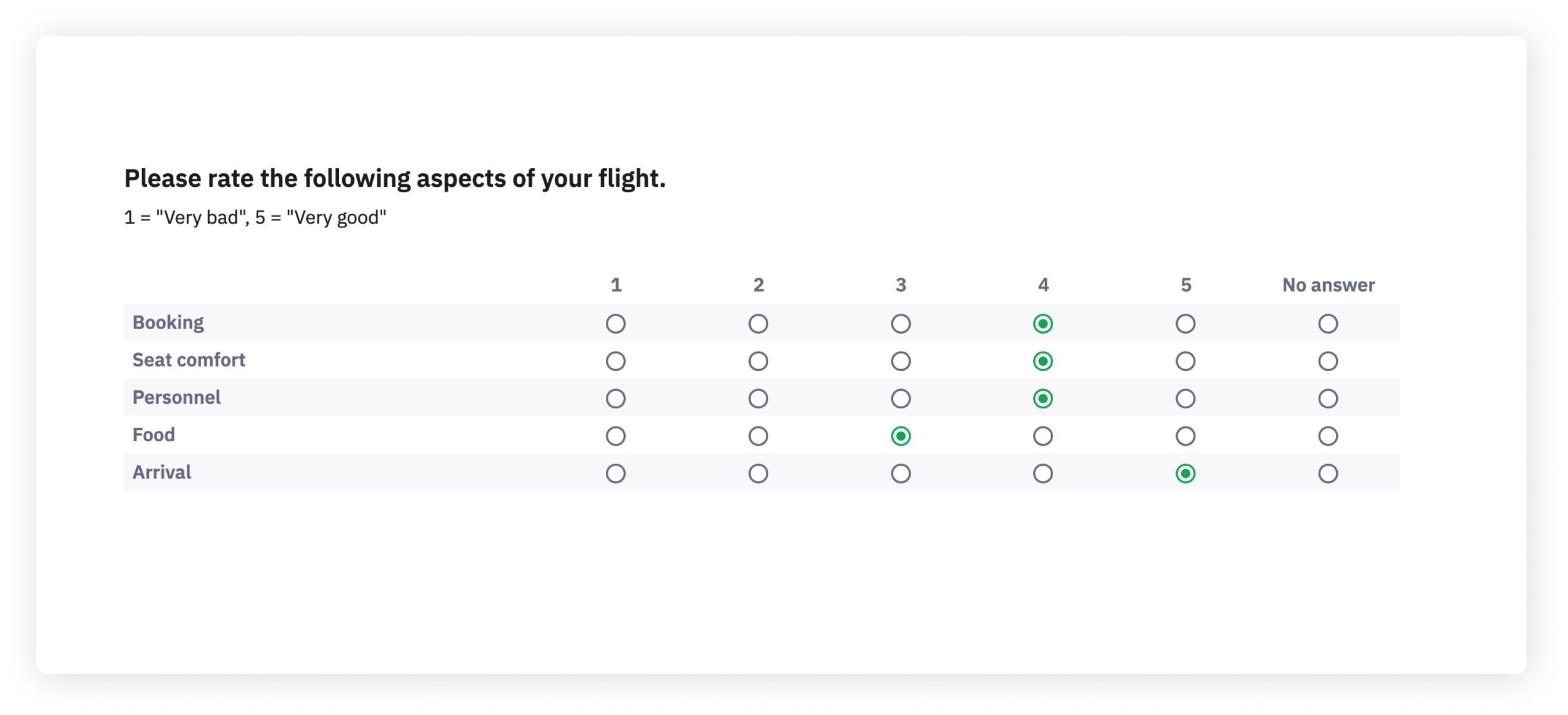
Open- and Closed-ended Questions
Closed-ended questions provide fixed options for respondents, such as "Did you find what you were looking for today? (Yes, No)".
Open-ended questions, on the other hand, allow for open-text responses like, "What improvements would you suggest for our website?"
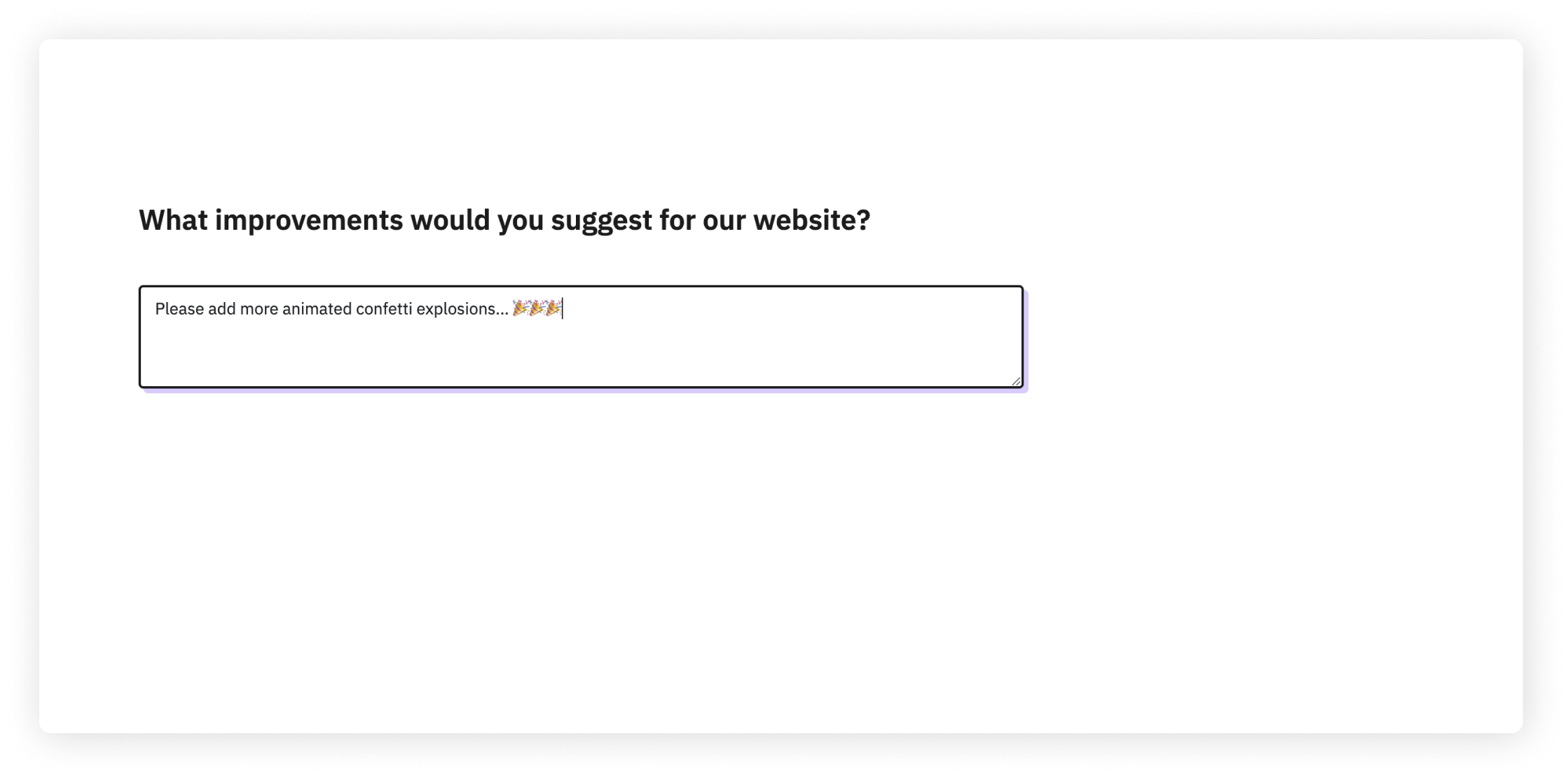
We'll dig deeper into the practical applications of these question types in the next section. Stay tuned for more enlightening insights!
Ideas on what to ask
Crafting the right survey questions is both an art and a science. It's a skill that requires understanding your objectives and your audience. Below are some fundamental considerations to stimulate your thought process:
-
Identify Your Goals: Before jotting down your questions, take a moment to define what you intend to achieve with your survey. Are you seeking customer feedback about a product? Do you want to understand your employees' job satisfaction levels? Or, are you trying to gauge the effectiveness of a recent event?
-
Know Your Audience: Understand who will be answering your questions. The language, tone, and type of questions you use should be tailored to fit your respondents. For instance, the questions you ask your employees would be different from those you ask your customers.
-
Keep it Simple and Relevant: Keep your questions clear, simple, and relevant to your survey goals. Avoid technical jargon and ensure that each question contributes to achieving your survey's objectives.
-
Strike a Balance: Include a mix of open-ended, closed-ended, and scaled questions. This way, you not only obtain specific data but also invite respondents to share their thoughts and experiences.
-
Test Your Questions: Before sending out your survey, test it with a small group to ensure the questions are understood as intended. This will help you catch any confusing or leading questions.
It's as easy as squeezing a lime. Sign up
Examples of common survey questions
Now that we've covered the basics, let's jump into examples for different scenarios. Below, we'll share some common survey questions for various sectors and purposes:
Survey Questions for Market Research
- How did you learn about our product/service?
- How likely are you to purchase our product/service again?
- What do you like most about our product/service?
- What improvements would you suggest?
Survey Questions for Employees
- On a scale of 1-10, how satisfied are you with your job?
- How strongly do you agree with this statement: "I feel valued at work."
- Do you feel your work contributes to the company's goals?
- What suggestions do you have for improving the workplace?
Survey Questions for Students
- On a scale of 1-5, how would you rate the effectiveness of the teaching methods used in the course?
- What did you find most challenging about this course?
- What suggestions do you have for improving the course?
Survey Questions for Universities
- How well does our program meet your educational goals?
- How would you rate the quality of teaching provided in your course?
- What improvements would you suggest for our course structure?
- How effective do you think the current course assessment methods are?
- Are the learning resources provided, including library and online resources, sufficient and helpful?
Survey Questions for Schools and Teachers
- How satisfied are you with the learning environment at school?
- On a scale of 1-10, how would you rate your teacher's teaching effectiveness?
- Do you feel your concerns are addressed promptly and effectively?
- How comfortable do you feel voicing your opinions in class?
- What would you suggest to make the school environment more engaging?
Survey Questions for Events
- How did you hear about our event?
- How satisfied were you with the event's organization?
- Would you attend a similar event in the future?
- What did you like most about the event?
- What suggestions do you have for improving future events?
Survey Questions for Businesses
- How often do you use our product/service?
- What factors influence your decision to choose our product/service?
- Is there anything we could do to improve your experience with our product/service?
- What additional features would you like to see in our product/service?
- How would you compare our product/service with others in the market?
Survey Questions for Marketing
- Where do you usually find out about our new products/services?
- How well does our marketing communicate the benefits of our product/service?
- Are our marketing messages clear and easy to understand?
- How much do our marketing efforts impact your decision to purchase our products/services?
- What type of marketing content do you find most appealing or persuasive?
Survey Questions to Ask About a Product
- What do you like most about our product?
- Is there anything you dislike about our product?
- What improvements would you suggest for our product?
- How does our product meet your needs compared to alternative products?
- If you could change one thing about our product, what would it be?
Survey Questions for Customer Satisfaction
- On a scale of 1-10, how satisfied are you with our product/service?
- How likely are you to recommend our product/service to a friend?
- How can we improve your experience?
- What aspect of our service exceeds your expectations?
- What aspect of our service could be improved?
Survey Questions About Social Media
- How often do you interact with our posts on social media?
- How useful do you find the information we share on social media?
- What type of content would you like to see more of on our social media platforms?
- Do you feel engaged with our brand on social media?
- How often would you like to see updates/posts from us on social media?
Survey Questions for Kids
- What is your favorite activity in school?
- Who is your favorite character in our program/book?
- What would make our program/book more enjoyable for you?
- If you could change something about school, what would it be?
- What do you like most about our book/program?
Survey Questions for Health Care and Hospital Satisfaction
- How would you rate the quality of care you received?
- How satisfied were you with the communication from our medical staff?
- How can we improve our service?
- How would you rate the comfort and cleanliness of our facility?
- Did you feel cared for and respected by our staff?
Wording best practices: How to write survey questions
Crafting questions for your survey is both an art and a science. The power of the right questions can unlock rich insights, while unclear or biased questions can lead to skewed results. So, let's dive in to discover the best practices to pen your survey questions.
Keep It Simple, Smarty (KISS)
Your questions need to be straightforward and simple. Avoid jargon, acronyms, or complex words. The goal is to make the respondent understand the question quickly, without having to read it twice.
Example: Instead of asking "How would you appraise our service?" opt for "How would you rate our service?"
Be Specific
Broad questions can lead to broad answers, which might not give you the specific data you're looking for. Make sure your questions are targeted and clear.
Example: Instead of "Do you like our products?" ask "Do you like our new spring collection?"
Avoid Double-Barreled Questions
Double-barreled questions ask about two topics but allow for only one response. This can confuse respondents and skew your data.
Example: Instead of "Do you like our pricing and product quality?" break it down into "Do you like our pricing?" and "Do you like our product quality?"
Avoid Leading and Loaded Questions
Leading questions point respondents in a specific direction, while loaded questions contain an assumption. Both types can bias your survey results.
Example: Instead of "Don't you think our app is user-friendly?" ask "How would you rate the user-friendliness of our app?"
Provide a Neutral Option
Sometimes respondents don't have a strong opinion either way. By providing a neutral option, you give them a choice without forcing them to lean in a direction they don't genuinely feel.
Consider Using Open-Ended Questions
These types of questions allow respondents to provide more detailed feedback. However, use them sparingly as they require more effort to answer.
Example: "What features would you like to see added to our product?"
Test Your Questions
Finally, test your questions with a small group before sending out the survey. This can help you spot confusing or poorly worded questions.
How many questions should be in a survey?
Finding the Goldilocks number of questions for your survey - not too many, not too few - can be a tricky task. The optimal number depends on your survey's complexity, the time you expect respondents to have, and the type of questions asked. As a rule of thumb, a survey should take no longer than 5-10 minutes to complete, which typically equates to around 10-20 questions.
What question order is best?
Ordering your questions correctly can have a significant impact on response rates and the quality of feedback you receive. Here are a few tips to consider:
-
Start with broad and general questions. These serve as a warm-up and are typically easier for respondents to answer.
-
Move to more specific questions. Once you have set the stage, you can delve into the specifics.
-
Place sensitive or potentially off-putting questions near the end. This ensures that you don't alienate respondents early.
-
End with demographic questions. These questions are often seen as less interesting, but they are essential for data segmentation.
Survey questions about personal information
Gathering personal information in your survey can help you segment your data and understand your audience better. But it's important to respect your respondents' privacy. Only ask for information that's absolutely necessary and always inform respondents why you're asking for it. Examples of such questions include "What is your age range?" or "What is your employment status?"
"What is your gender?" Survey question
Asking about gender nowadays in a survey can be delicate, and it's essential to approach this question with sensitivity. An inclusive way to ask this question is to provide multiple choices beyond just 'male' and 'female', such as 'prefer not to say' and 'other (please specify)'.
Example: "Which of the following best describes your gender? (1) Male (2) Female (3) Prefer not to say (4) Other (please specify)"
Survey question templates
Templates can be a great time-saver when creating a survey. Here are a few basic templates to get you started:
-
Satisfaction questions:
- On a scale of 1-10, how satisfied are you with [product/service]?
- How would you rate your overall experience with [product/service]?
- How likely are you to recommend [product/service] to a friend or colleague?
- How satisfied were you with our customer service interaction?
- Are you satisfied with the quality of [product/service]?
-
Usage questions:
- How often do you use [product/service]?
- How frequently do you purchase [product/service]?
- On average, how many times a week do you use our [website/app]?
- How often do you use [specific feature] in our [product/service]?
- How often would you say you need to use our [product/service]?
-
Comparison questions:
- How does [product/service] compare to similar options on the market?
- In comparison to our competitors, how would you rate the value for money of our [product/service]?
- How would you compare the quality of our [product/service] to others you have used?
- Would you say our [product/service] meets your needs better than other options you've tried?
- How does our customer service compare to that of other companies you've interacted with?
-
Improvement questions:
- What can we do to improve [product/service]?
- Are there any features you would like us to add to our [product/service]?
- What changes would most improve our [product/service]?
- How could we make our [product/service] more useful for you?
- If you could change one thing about our [product/service], what would it be?
Survey questions generator
If you're struggling to come up with the perfect questions for your survey, LimeSurvey has got your back! Our powerful Survey Questions Generator can help you create compelling, effective questions in no time.
There you have it! The art of creating powerful survey questions demystified. Remember, the key to a successful survey is not only asking the right questions but asking them the right way.
So, now that you're armed with these tips and tricks, it's time to create your own knockout survey!
Happy surveying!
Step into a bright future with our simple online survey toolThink one step ahead.

